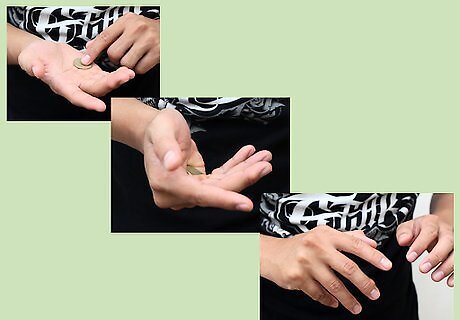
views

Decide on the illusion. Impromptu magic is a very broad field of magic with endless possibilities. The illusion can range anywhere from making something disappear, to changing one item into another completely. Items used can include seemingly anything. Items such as pens, toothpicks, napkins, paper, dollar bills, and more are typically used in impromptu magic. It is completely up to the magician what type of illusion they wish to perform and what items they wish to use. Keeping this in mind will always give the magician the upper hand. However, true impromptu magic involves doing magic that is improvised with borrowed items, opposed to your own, and nothing more. This tends to lead to a much stronger effect in the end and will impress the audience that much more.

After deciding the type of impromptu trick to perform, consider the source used to obtain information on the illusion. The internet is a great source to obtain information on impromptu magic however, it is not the only source. Other sources include magic books, professionals, and sometimes even friends or family. Each of these sources has their own advantages and disadvantages. Magic books and professionals will tend to be the more credible sources; however sometimes learning from a book can be difficult, opposed to hands on learning or a video tutorial. The internet, family, and friends are usually the cheapest and most convenient methods of learning impromptu magic. However, when choosing a source it is important to keep in mind that deceiving a live audience is much different than deceiving a single webcam. With this now in mind, consider that the money spent on getting the most valuable information from the most trusted sources can possibly be more beneficial. Always consider multiple sources for a broader learning experience.

Focus on the mechanics and experimentation of the trick. Many impromptu magic tricks involve misdirection, or acts of diverting an audience's attention. Impromptu tricks also involve something called “sleight of hand,” which is simply a cleverly executed hand motion or act of deception in order to produce the proper illusion. It comes in many forms and combinations and can be used to produce multiple effects. Often when learning a new trick immediate repetition of “sleight of hand” is conducted in hopes of memorizing the steps of the illusion. Repeating an illusion's actions without any thought only causes other possibilities to vanish. Keeping an open mind is very important when learning impromptu magic. There are countless ways a trick can be interpreted and applied. Being open to new ways of performing a trick and never blindly repeating is the best mindset to have in regards to the experimentation of the trick.

Practice and refine. Once the mechanics have become second nature and come clearly into focus, the refinement and polishing of the trick can begin. Practice is the most important step to learning impromptu magic. A good magician will often practice a trick numerous times before performing it in front of an audience. As a close-up impromptu magician knowing how to adapt to different situations is important. Using a mirror to practice will display how the illusion looks from multiple angles and allow for that much more efficiency when performing. It is also important when practicing to slowly increase the audience size. Begin with a mirror then move on to a single close friend or family member. If the up-close illusion is successful continue to practice on other individual close friends or family members before moving on to larger audiences. Larger audiences mean more eyes on the magician which will require that much more misdirection and “sleight of hand” to make the illusion a success.

Just do it. As simple as it may sound, this is not always the easiest thing to do. When in front of an actual audience nerves can begin to have an effect. The key is to remain calm and composed and remember any practice methods. Luckily impromptu magic tends to be one-on-one or with small crowds. Impromptu magic often occurs when individually asked to show someone a magic trick. This will help deal with any nerves of facing large crowds as impromptu is usually a spur of the moment illusion. Again, simply keeping calm, remembering practice methods, and keeping in mind that the audience does not know what is going to happen, can put the magician at ease and allow them to perform comfortably.



















Comments
0 comment